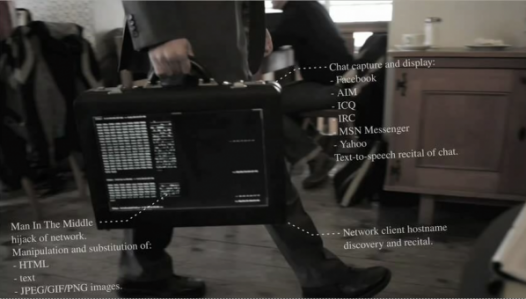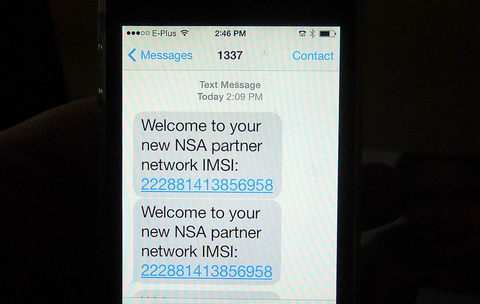It is vital that technology-based art remain a frame with which we can develop critical discourses about the world we live in, from the engineered to the cultural and political. Sometimes that requires that we are not limited by exaggerated fears and legal definition, but that we act proportionally and with conscience in our efforts to understand the power struggles and tensions in our (technically mediated) environment.
Born in New Zealand and settled in Berlin, Julian Oliver is an artist, videogame developer, interface and expanded reality designer, open software programmer, educator. He is the author of many of projects in which public technology and open code are recombined creatively to make visible what certain digital technologies try to keep hidden. The political implications of the devices he makes are not just speculative, but are also meant to be used as instruments of performance and action in the hands of artists, activists, and all sort of experimenters.
For instance, the Transparency Grenade (2013) is a pseudo-granade that contains a micro-computer, a microphone and a strong wireless antenna that captures the information traffic and sound in enclosed spaces and transmits them anonymously to a dedicated server that extracts the data, shown in a map online.
Newstweek (made with Danja Vasiliev in 2011) is a “reality distortion” device: a small and discreet mechanism that allows you to intercept all communications that travel a wireless network and modify its contents in real time and before they get to other devices connected to this network. A conceptually similar device was used in the operation Men in Grey (also with Vasiliev).

With the software Artvertiser (made in 2010 in collaboration with Damian Stewart and Arturo Castro) he used augmented reality to substitute every piece of advertisement detected by the program, be it in magazines, moving vehicles or buildings, generating an alternative vision in which the public space turns into a space modifiable with messages and anonymous images, in contrast to what normally happens in public spaces privatized by publicity.
His latest project - PRISM - The Beacon Frame also in colaboration with Danja Vasiliev - employs the same techniques of wireless (WiFi) device localisation and mapping, cell-tower hijacking and wireless packet inspection known to be in use by state sanctioned surveillance agencies such as the GCHQ (UK) and NSA (USA).
In the opening of the 2014 edition of the famous Berlin festival Transmediale, a PRISM-The beacon frame device, installed by Oliver and Vasilev, intercepted the signals from hundreds of cell phones, sending them unwanted communications while gathering private information. The festival’s technicians decided to sabotage the installation and threatened to contact the police. Ironically, the German Parliament, physically located a few steps from the festival’s venue, had just denounced publicly the illegal spying on German communications perpetrated by the US National Security Agency.

In 2012, along with Gordan Savičić and Danja Vasiliev, Oliver published the Critical Engineering Manifesto. A declaration of the principles that serve as a foundation for the work of the “critical engineer”: to make visible the language that is shaping the way we move, communicate and think; to study our dependency to technology; to reflect on the political implications of the use of technology and the techno-political challenges that each innovation brings; to observe the space of freedom between the production and consumption of technology.
The work of Julian Oliver has been presented and praised in many and very diverse festivals, encounters and international institutions such as Tate Modern, Transmediale, the Chaos Computer Congress, Ars Electronica, FILE and Japan’s Media Arts Festival. Articles on his individual and collaborative projects appear in the BBC (UK), The Age (Australia), Der Spiegel (Germany), Liberation (Francia), The New York Times (EE.UU) The Guardian Online (UK), Cosmopolitan (EE.UU.), Wired (internacional), Slashdot (EE.UU.), Boing Boing (EE.UU.), Computer World (internacional), El País and La Vanguardia (Spain).
